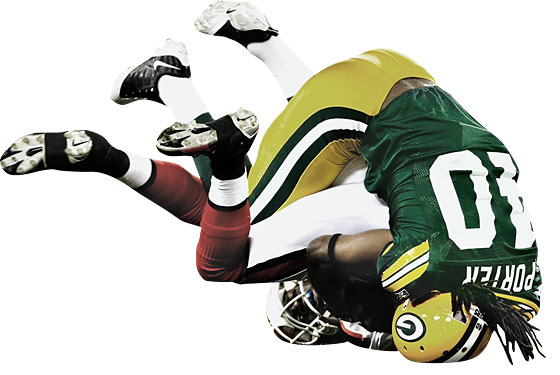
This football season will go down as the one during which the word concussion started appearing in the sports pages about as often as touchdown. As if it was ever in doubt, studies have now confirmed that playing the sport is extremely hazardous to your health. There is nothing vague or ambiguous about the risks. Players are shaving years, if not decades, off their lives, as well as significantly raising their chances of dementia. Unlike baseball or basketball, injuries aren’t incidental to football—they’re a natural outcome of a game in which giant men collide with all their might. But it also presents a paradox. The reason we love the sport, after all, is its speed and violence. Players destroy themselves to win, which makes it like nothing else in life, except perhaps actual combat, which is rarely well filmed.
So how can we go on watching? Every football fan has memories that we willfully suppress. For me, the most searing experience was the famous sack of Redskins quarterback Joe Theismann by Lawrence Taylor, in which Theismann’s shin bone bends in half, as if he had an extra knee. The clip is football’s version of a snuff film, so popular on YouTube that if you type the word Theismann into the search box, the first suggestion is “leg break.” The sports website Deadspin keeps track of more recent disfigurements, posting videos with titles like “2009 Just Can’t End Without Another Shattered Limb.”
As the brutality of the sport has become quantified, the efforts to sentimentalize it have grown more intensive. Consider the surprise hit movie The Blind Side, which took Michael Lewis’s morally nuanced tale of a wealthy family’s adoption of a disadvantaged football prodigy and turned it into a Hallmark card of upper-class magnanimity. A football career is, in this fairy tale, the greatest salvation for kids who grow up with nothing. Never mind that the real-life protagonist, Michael Oher, now starting at right tackle for the Baltimore Ravens, might be lucky if he’s ambulatory and able to count to ten on his 50th birthday. That’s the trade-off: Players unthinkingly accept these risks not only in pursuit of riches but for the fame and adulation.
It’s hardly just Hollywood that tries to soften the sport’s jagged edges. When Urban Meyer, the highly successful coach at the University of Florida, announced his unexpected resignation, ESPN commentators practically wept with admiration for an exemplary leader who instills moral character into callow young men. Should we not care that Meyer is extravagantly paid to oversee players whose only compensation is a free education they don’t have time to pursue and a long-shot chance at a professional career? The cruel part is that the real losers may be the few who actually play in the pros and thereby increase their risk of a painful and disorienting middle age.
As it turns out, the pads and helmets and sheer superhuman size of the players can’t make you forget that these are real people crippling themselves for our entertainment. Though we may turn away from the replays of gruesome, shin-bending injuries, the ever-present threat of severe bodily harm is part of why we’re sitting there watching in the first place.
Have good intel? Send tips to [email protected].